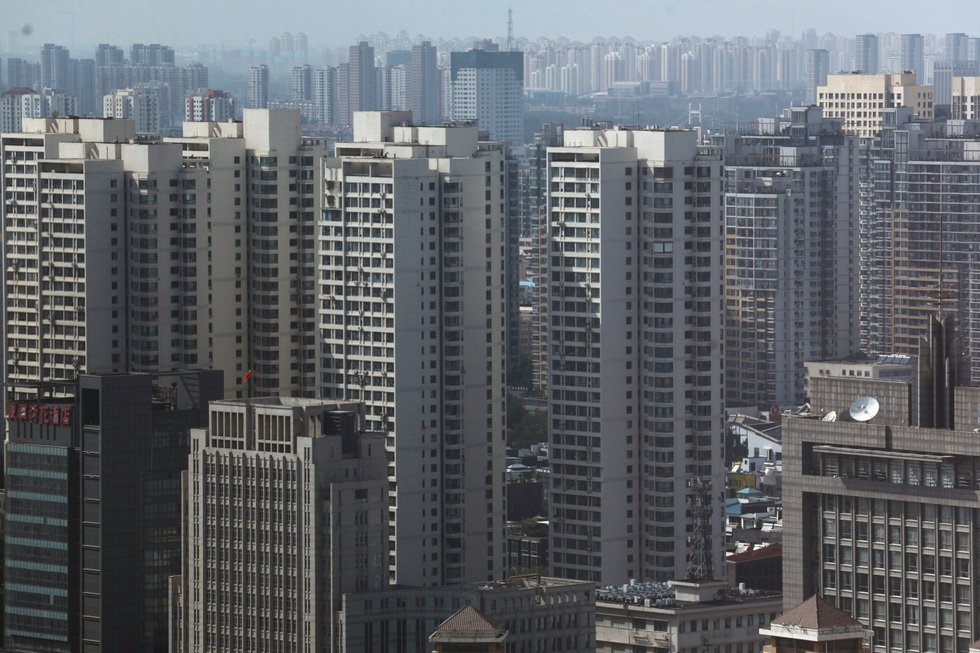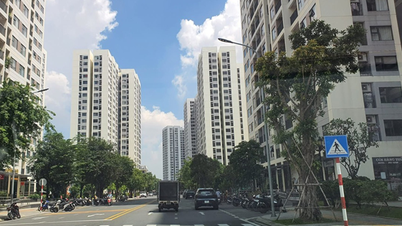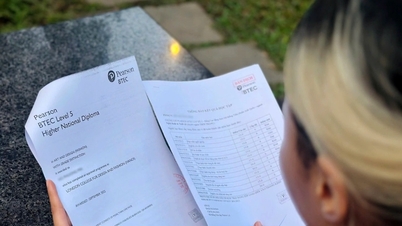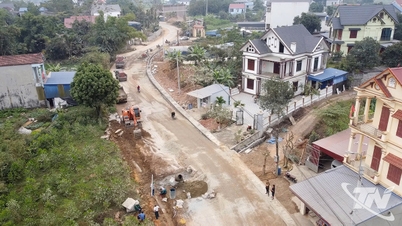Amidst a four-year slump in China's real estate market, a bizarre story is circulating on social media. As millions of homeowners face the prospect of "negative equity" (the value of their home falling below their remaining mortgage) and the risk of losing their property entirely, an unexpected solution has emerged: even if your home is foreclosed on, you can still legally retain ownership.
Curiosity prompted a reporter from Lianhe Zaobao to investigate. Just a few days after leaving a comment on a post, he received more than a dozen messages from "experts," all claiming they could help "save the house."
This is the gateway to a shadowy business, a unique service born from the very desperation of the market.

Amidst the frozen Chinese real estate market, a shadowy home-saving business is raking in money as homeowners with negative equity seek to retain their properties by buying back their own bad debts (Photo: Reuters).
Unique home rescue tactics
"You're not just losing your house; you're falling behind by a decade compared to others. Buying a new house will be a distant dream," a female expert warned over the phone, after spending half an hour analyzing the severe consequences of stopping debt payments.
After filling the client with anxiety, she launched her first tactic: restructuring the loan to reduce the monthly payment, helping the homeowner temporarily weather the difficult period. "Just hold on for a few more years, and house prices will surely rise again," she said confidently.
But the real secret is only revealed when the customer shows hesitation. This process is far more complex and daring.
That's a deliberate default. In that case, the homeowner stops making installment payments, allowing the bank to seize the property and put it up for auction.
That's when "relatives" step in. A trusted relative or friend, with the help of a "home rescue company," will participate in the auction and buy back the house, often for only half the market value. On paper, ownership has changed, but in reality, the previous owner retains full rights of use.
It also involves buying back one's own debt. Because of the low auction price, the bank debt remains unpaid. The bank will continue to pursue the remaining amount. However, if the homeowner has no other assets to seize, the bank will "terminate enforcement" and sell the bad debt to an asset management company (AMC) at a significant discount, usually only 30% of the original value. At this point, through the intermediary company, the defaulter can buy back their own debt at a bargain price.
The result was a perfectly broken vicious cycle. The homeowner not only kept their home but also eliminated a large portion of their debt burden. Of course, this "miracle" didn't come free.
"Home rescue" services - profiting from the pain of bankruptcy.
The rise of "home rescue companies" is the clearest evidence of the law of supply and demand, even in the most dire circumstances. When millions of people face the same problem, a new service industry will emerge to solve it.
Their business model is based on exploiting legal loopholes and customers' lack of information. The service fees are not cheap, ranging from 5% of the initial loan amount, or from 8% to 20% of the remaining balance. For mortgages worth millions of yuan, this is a huge sum.
"We're not taking your money. We're only taking the principal you owe the bank," a female expert explained. This argument, though somewhat fallacious, struck a chord with those in dire straits: it's better to pay a large fee to retain assets and reduce debt than to lose everything.
The size of this market is rapidly expanding. On the RedNote platform, the topic "mortgage defaults" has attracted nearly 60 million views. Companies boast that they have experience handling bad debts for all types of assets, from apartments and offices to hotels and factories, and now operate nationwide.
Statistics also partly confirm this. Guoxida's data shows that in 2024 alone, 658,000 properties were put up for judicial auction, a 51.69% increase from the previous year. Other research institutes even report higher figures, up to 1.6 million properties.
However, analysts warn that home rescue services are only a temporary painkiller and cannot cure the root cause. Homeowners participating in this process are putting themselves on a legal choke point, risking becoming entangled in complex litigation and a more serious credit crisis in the future.
On a macro level, the way bad debts are being "manipulated" and transferred around is tantamount to planting another time bomb in China's already fragile financial system.

International investors are once again frantically selling off assets worth $140 billion at record-breaking losses. Pictured are two nearly vacant residential plots in a project in Qidong City, China, controlled by Oktree Capital Management (Photo: Bloomberg).
A devastating exodus: $140 billion worth of commercial real estate "vanishes".
In stark contrast to the efforts of citizens to retain their assets, international investors are undertaking a massive and devastating exodus. The nearly $140 billion they invested in office buildings, shopping malls, and warehouses in China over the past 15 years is now becoming a huge burden.
Prominent names on the global financial map such as BlackRock, Carlyle Group, HSBC, and Standard Chartered are all exploring ways to exit, including selling assets at significant losses.
According to Bloomberg Intelligence, the total value of distressed asset sales in China reached $16 billion between 2023 and 2024, accounting for 22% of last year's total transactions – an unprecedented rate. Bankers and investors estimate that the capital value of Grade A office buildings in Beijing and Shanghai has evaporated by at least 40% compared to its peak in 2019.
Classic "abandoning ship" deals have become widely circulated stories in the financial world.
BlackRock's "wipeout": In late 2024, after failing to sell two office buildings in the Waterfront Place complex (Shanghai), BlackRock's fund decided to abandon the assets, leaving Standard Chartered Bank to handle the 780 million yuan loan. This move caused their 420 million yuan equity investment to completely evaporate.
Carlyle's 50% loss deal: Also in Shanghai, Carlyle Group's fund sold The Crest building for 826 million yuan, only 57% of the price they bought it for nearly a decade, even less than the 1 billion yuan mortgage loan.
Oaktree's "Venice of the East": Even a "vulture" fund specializing in hunting hard-to-find assets like Oaktree Capital is struggling with the Evergrande Venice resort mega-project, which they seized from Evergrande. House prices there have fallen by more than half from their peak.
Even the logistics sector, once considered a bright spot thanks to the e-commerce boom, is not immune to oversupply. Blackstone, one of the biggest players, is reportedly forced to accept an average 25% reduction in rental rates to retain customers.
The solution cannot simply be "saving the house" or "selling off" assets.
The picture becomes even bleaker when looking at the macroeconomic data. The latest report from China's National Bureau of Statistics (NBS), released on October 20th, shows that new home prices in September fell 0.4% compared to the previous month – the fastest monthly decline in 11 months.
The decline is widespread, from first-tier cities like Beijing and Shenzhen to lower-tier urban areas. Goldman Sachs notes that smaller cities are facing compounded difficulties due to "weak growth fundamentals and severe oversupply."
For commercial real estate, the situation is even worse. The office vacancy rate across China in 2024 reached nearly 25%, the highest level in history. Building owners were caught in a fierce "price war," causing average rents to fall by 6.9% – the sharpest annual decline ever recorded. CBRE forecasts that the Shanghai market will not be able to absorb all the new supply before 2028.

The warning of a "lost decade" for Chinese commercial real estate is becoming clearer than ever (Photo: Getty).
The contrasting stories of Chinese citizens desperately trying to hold onto their homes and international financial institutions selling off assets in China are both symptoms of the same ailment: a collapse of confidence and a severe supply-demand imbalance.
No matter how clever or unique the "housing rescue" scheme may be, it's only a temporary solution, a way to cover up a festering wound instead of healing it. It doesn't address the root problem: housing prices have fallen too low and people's incomes are no longer secure.
Meanwhile, the flight of foreign investors is a clear vote of no confidence in the market's recovery prospects. They no longer believe in the growth story of Chinese real estate.
Oxford Economics expert Nicholas Wilson issued a cautionary assessment: “By 2030, the nominal value of buildings could be even lower than in 2020.” According to him, the prospect of a “lost decade” for Chinese commercial real estate is gradually becoming a reality.
Clearly, the solution to this crisis cannot lie in financial tricks or panic selling. It requires a more comprehensive solution, stemming from economic recovery, job stability, and most importantly, rebuilding confidence among both the public and investors.
Source: https://dantri.com.vn/kinh-doanh/dich-vu-cuu-nha-giua-bao-khung-hoang-bat-dong-san-o-trung-quoc-20251027155527714.htm

















































































































Comment (0)